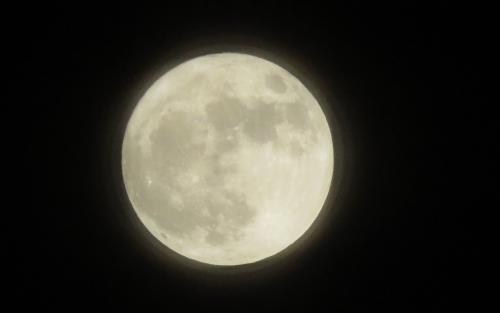(单词翻译:单击)
Hey there, Squeaks! What are you looking at?
嘿,吱吱,你在看什么呢?
Oh, the moon! That's my favorite thing to look at in the night sky.
噢,月亮!这是我晚上最喜欢看的。
It's so big and bright, and you can see tons of craters, those dips on the surface!
它又大又明亮,你可以看到很多陨石坑陷在它的表面!
Did you know that the Earth and the moon are about the same age?
你知道地球和月球年龄差不多吗?
They're four and a half billion years old!
它们都是45亿岁!
Earth's moon is pretty cool, but it's not the only moon in our solar system.
地球的卫星很酷,但我们的太阳系不止这一颗卫星。
I kind of like Earth's moon best!
我最喜欢月亮了!
But have you ever wondered where it came from?
但你好奇过它是从哪儿来的吗?
Lots of scientists have wondered about that, too!
许多科学家也想知道。
And they think it had to do with a huge crash.
他们认为它与一次大碰撞有关。
Since the Earth and the moon are around the same age, that means they both formed around the same time.
因为地球和月球年龄大致相同,表示它们几乎同时形成。
But Earth is a tiny bit older, so it formed first, and then we got our moon.
但地球稍微大点儿,所以先形成,然后再有月球。
Astronomers, scientists who study things in space, have a few different ideas about how exactly the moon came to be.
研究太空的天文学家和科学家们对月球的确切来源存在几种不同的看法。
And after a lot of research to learn more about the moon, here's what they think happened:
他们在做了大量的研究来了解月球后,确认了以下的观点:
Around the same time the Earth was forming, when our solar system was very new,
我们的太阳系还年轻时,几乎地球形成的同一时间,
a planet about the size of Mars crashed into the Earth!
一颗火星大小的行星撞击了地球!
As that enormous rock, which astronomers sometimes call Theia, collided with the Earth,
由于那块巨大的岩石,也是就天文学家所说的“忒伊亚”,与地球相撞,
it would have made a huge impact, way bigger than any meteor crater!
它产生的巨大影响比任何陨石坑都大。
This crash was so powerful that rocks and other pieces of the Earth were launched up into space.
这次撞击很强,使得地球的岩石和其他碎片飞射到了太空。
Eventually, these rocks began to stick together and form what we know as the moon.
最终,这些岩石开始粘在一起,形成了我们所知的月球。
What's that, Squeaks?
吱吱,那是什么?
Oh! Squeaks wants to know if the animals and plants on Earth were okay after the impact, and that's a great question.
哦,吱吱想知道那次撞击之后,地球上的动植物怎么样了。这个问题问得好。
Well, there actually weren't any animals or plants on Earth yet!
实际上,那时的地球还没有动植物呢!
At the time the moon was forming, the Earth was very new, and it didn't look at all like the Earth we live on today.
月球形成时,地球非常年轻,它和我们现在居住的地球一点儿都不像。

Back then, Earth was rocky and full of active volcanoes.
那时的地球多岩石,到处都是活火山。
It didn't have any liquid water, plants, animals, or robots.
没有任何液态水、植物、动物和机器人。
So there was nothing around to get hurt by the crash … just a lot of broken rocks.
所以除了许多破碎的岩石以外,没有东西因撞击而受伤。
After the moon formed, it also started to orbit, or go around the Earth, like how the Earth goes around the sun.
月球形成之后,也开始绕着地球旋转,就像地球围绕太阳旋转一样。
People on Earth have always been fascinated by the moon, and scientists have been studying it for a long time.
地球上的人们总是对月亮着迷,科学家们已经对它研究了很长一段时间。
We've learned a lot by sending spaceships to the moon,
我们通过发送探测器了解了许多它的知识,
and when astronauts visited, they even collected some rocks and brought them back to Earth to be studied.
当宇航员参观它时,甚至收集了一些岩石带回地球进行研究。
One really cool thing astronomers have learned by studying them is that some rocks on the moon are a lot like rocks on Earth!
天文学家通过研究发现,月球上的一些岩石很像地球上的岩石,这是一件很酷的事。
And that's exactly what you would expect,
这和想得一样,
if a lot of the moon is made up of the Earth rocks that got launched into space when Theia crashed into us.
如果许多月岩是“忒伊亚”撞击地球时进入太空的话。
We still aren't completely sure that the moon formed from a huge crash.
我们还不能完全确认月球是一次大碰撞形成的。
But it's our best guess based on everything we know about Earth and the moon.
但我们的最佳猜测是基于我们已知的地球和月球的知识。
Since we can't go back in time to see if a collision formed the moon, as awesome as that sounds,
因为我们不能逆转时空去看是否是撞击形成了月球,尽管这听起来很了不起,
studying Earth and moon rocks is the best way for us to figure out what happened.
研究地球和月球的岩石是我们弄清发生什么的最佳途径。
So, Earth and the moon have some things in common!
所以,地球和月球有一些相同点!
But the moon is still a very different place from our planet.
但月球仍和地球有很大的差别。
For one thing, the moon is much smaller than Earth, and it doesn't have air you can breathe, or oceans.
一方面,月球比地球小得多,它上面没有可以呼吸的空气或海洋。
And it's covered in craters.
而且它上面满是陨石坑。
Those come from tons of giant asteroids hitting the moon billions of years ago!
它们是数十亿年前巨大的小行星撞击月球时产生的!
Today, the moon is over 400,000 kilometers away from the Earth! That's a very long trip.
如今,月球离地球有40万公里远!非常远的旅途!
It's about the same as going all the way around the Earth 10 times.
它等于绕地球十次的距离。
So the next time you see the moon in the sky, you'll have an idea of how it got there!
所以下次你看天上的月亮时,你就知道它是怎么到那的!
Thanks for joining us!
感谢您的收看!
If you want to keep learning and having fun with Squeaks and me, hit the subscribe button,
如果你想继续和我与吱吱共度美好时光,点击订阅键,
and we'll see you next time, here at the Fort!
我们下期见,沃斯堡等你哦!


